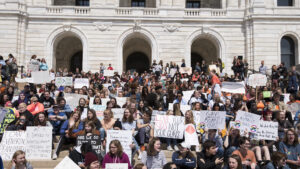
The United States is currently facing an epidemic of school shootings. While some have called for more gun control legislation to be passed, others believe that having a greater police presence on K-12 campuses will help reduce violence and eliminate shootings. Although police, in theory, should be the solution to safety concerns, their presence creates a hostile learning environment that will unfairly disadvantage students who come from underrepresented communities or are people of color. The police system has been largely criticized in previous years for their use of force against the Black community and others for profiling them. With calls to defund and reform the police system, they should not be allowed to create fear and terrorize the next generation.
Supporters of having more police in school claim that they will decrease bullying, violence and drug use, as well as being able to respond if there is a major emergency. Citing police presence in K-12 schools will help deter or be able to assist in the case of a school shooting, however, is a weak argument. In the Uvalde shooting last year, police failed to respond in a reasonable amount of time and even prioritized their own children’s safety over the general school population. Having more guns on school campuses does not limit gun violence, it only creates more risk of one of these guns being misused. Saying that guns are the problem and then introducing more guns is counterintuitive. Without proper training for police to handle student altercations or mass shootings, their presence will do more harm than good.
Students today, especially in lower income areas, already face substantial security measures when attending school. Many have to go through security checks, metal detectors and wear lanyards while the school is surrounded by large fencing. The students are the ones who are supposed to be protected, yet they are also being treated as criminals. Having police added to this mix will create an environment where students feel uneasy and are distracted from their learning. Having regular security already on most campuses should suffice instead of needing to contract local police agencies to “solve” these problems. Police have been known to use excessive force and lack training for diverse groups like those who are neurodivergent, part of the LBGTQ+ community and people of color. The dangers that may arise by giving police control over minors is overall unknown but should be taken into account.
Additionally, the police system is known for being historically racist. They were created as an organization that would capture and return run away slaves and reinforce Jim Crow laws. Knowing this historical context, along with the several cases of police brutality against people of color in recent years, should be alarming. Parents shouldn’t have to worry about their child getting racially profiled and attacked by a police officer while they are at school trying to learn. There is already a school to prison pipeline in this country that will increase if students are made to feel like they are the problem. Even adults who have done nothing wrong tense up when they see a police officer driving next to them on the road. Adding this stressor will cause more students to drop out and fall through the cracks of the educational system.
One solution to this problem is that instead of using school spending to pay for police, the money should go towards programs that will provide more counseling services and mental health aid to students who are struggling. Students who engage in violence and drug use often have problems going on in their home lives and should not be punished by having a police officer scold them at school. Instead they should be given access to support systems so that they can overcome these problems and continue with their education. Other students who are the first in their family to attend college also face struggles with navigating the application process. By having councilors that want to uplift and aid students through it, they will be more likely to receive an education instead of falling behind or joining a gang.
In Los Angeles, where they are seeing an increase in police on K-12 campuses, the Students Deserve, United Teachers Los Angeles, the ACLU of Southern California, the Los Angeles Alliance for a New Economy, the Collective for Liberatory Lawyering and Reclaim Our Schools L.A. have all sent a joint letter to the school board opposing increased policing. With the wide support for a decrease in policing in schools, the school board and supporters of police should listen to those being affected the most; the students. Gun violence is an institutional problem that cannot be solved by placing an officer at the front of a school. Instead legislation and gun control is needed to solve this epidemic that only the U.S. seems to face.







